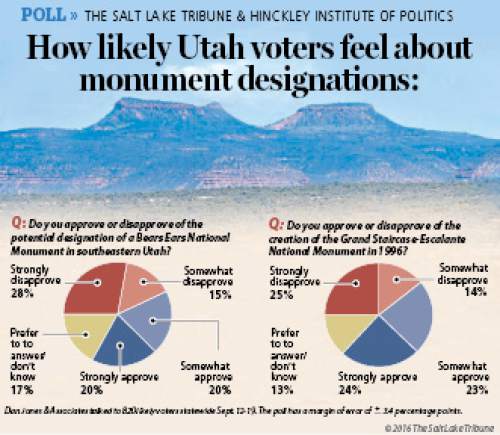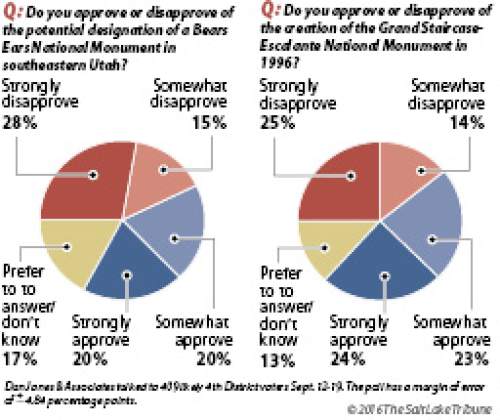This is an archived article that was published on sltrib.com in 2016, and information in the article may be outdated. It is provided only for personal research purposes and may not be reprinted.
Washington • Utah's elected leaders and some members of the Navajo Nation argued Wednesday against presidential action to name a Bears Ears National Monument, saying the communities that will be impacted in the southeastern corner of the state are tired of federal overreach.
"We don't want it. We don't need it," Utah Gov. Gary Herbert said outside the U.S. Capitol, surrounded by five members of Utah's federal delegation and three American Indians from San Juan County. "It will, in fact, not bring us together; it will, in fact, pull us apart."
The pushback against a monument designation comes as a new Salt Lake Tribune-Hinckley Institute of Politics poll shows Utahns are split over a new national monument, with about 43 percent opposing the idea and 40 percent backing it. About 17 percent were unsure. Utahns younger than 35 favored a monument by clear majorities, while a plurality of older residents opposed it.
The debate is intensifying as President Barack Obama's tenure nears an end. An Interior Department official this week told The Tribune that Interior Secretary Sally Jewell told Gov. Gary Herbert she feels an "urgent" need to protect the area and its tens of thousands of archaeological sites. The comment may hint at action in the coming months by Obama, who has unilateral power to name a monument under the 1906 Antiquities Act.
The official, speaking on background about a private meeting between Jewell and Herbert, said both officials agree there is "broad consensus" to protect the Bears Ears region.
"However," the official said, "the secretary believes the need is urgent, especially since there have been proposals to protect this special place for over 80 years."
Rep. Rob Bishop, a Utah Republican who has introduced legislation to protect parts of the region, balked at the suggestion of urgency, noting that the land is under Interior Department control — mostly through the Bureau of Land Management.
"So she's afraid she's not doing her job and would like to do her job in a different way with a different category?" Bishop said in an interview. "That makes sense, doesn't it."
At the Capitol news conference, the Utah officials hosted three Native Americans from the Bears Ears area who said they fear traditional activities would be curtailed by a monument.
"We do not want our backyard to be a monument," said Danielle Shirley, a Navajo from San Juan County.
Susie Philemon broke into tears as she recalled how many times the federal government had made promises to Native Americans that never came true. She said the same would happen with a monument.
"Please don't break more promises. Not again," she said.
Sen. Mike Lee said that Native Americans and southeastern Utah residents "don't want their land seized by some distant, closed government operating thousands of miles away." And he added that Obama and Jewell need to listen to the people who live there.
"Remember we live in a republic, we live in a land where the voice of the people is supposed to be heard," Lee said.
Added Sen. Orrin Hatch: "Frankly, we're getting tired of outside people coming in to manage our lands when we can do it better."
But the monument is supported by 26 southwestern Native American Tribes, including the Navajo Nation Council, the Nation pointed out in a news release issued after the Capitol Hill news conference.
The Utah delegation said it supports the efforts of Bishop and Rep. Jason Chaffetz to pass the Public Lands Initiative (PLI), which would impact 18 million acres in southern Utah but set aside less of the Bears Ears region than the proposed national monument and use different standards for protection.
The House Natural Resources Committee is set to take up debate on the bill Thursday, though it's unclear when the full committee will vote. Congress is set to adjourn next week until after the Nov. 8 election.
Environmental groups and tribal leaders have panned the PLI as giving away too much to the oil and gas industry and ignoring the requests of Native Americans.
"After four squandered years, the PLI is terrible one-sided legislation that would defile Utah's Redrock wilderness and has no chance of passage," said Scott Groene, executive director of the Southern Utah Wilderness Alliance. "President Obama must step in to protect the Bears Ears, now that the Utah congressional delegation has failed."
Of the Tribune-Hinckley poll, Bishop said he was "probably surprised there isn't a larger amount of support" for a monument given that most of Utah's populace lives along the Wasatch Front and not near San Juan County where the monument would be centered.
"If you go down to the county, where people live and will be using this, the opposition is much louder and much more boisterous," Bishop said.
Herbert said the poll clearly shows there is not local support for a monument and the Obama administration should pay attention.
"At best, we're divided," Herbert said. "If we can't build consensus, then we're not ready."
The poll showed 28 percent of respondents strongly disapproved of a monument and 15 percent somewhat disapproved. Some 20 percent of voters strongly approved and another 20 percent somewhat favored the designation.
The survey, conducted by Dan Jones & Associates, shows a deep age gap. Utahns 18-24 approved a monument five-to-one, with those 25-34 favoring a monument three-to-one. A majority of those 45-54 opposed a monument, as did pluralities of all other age groups over 35.
Dan Jones, president of the polling company, says it's likely that voters over 35 remember the surprise designation of the Grand Staircase-Escalante National Monument by then-President Bill Clinton in 1996. And he says younger voters are more environmentally friendly.
"Young people today have been taught to work and protect the environment and watch over water and all kinds of things," Jones said.
The Tribune-Hinckley Institute poll showed a much different result about the monument than a poll conducted in July and August for Utah Policy that showed only 19 percent of Utahns want a national monument in the Bears Ears area. That poll gave three options: a monument, Bishop's legislation or no action at all.
Jones noted the Tribune poll simply asked support or opposition to a monument while Utah Policy's monument question attached President Obama's name to the designation.
Using Obama's name could affect the results in Utah, where the president is not well liked, Jones said.
"I'm only guessing, but I think it does," he said.
While the debate over a potential Bears Ears monument rages, last Sunday marked the 20th anniversary of the designation of the Grand Staircase-Escalante National Monument by then-President Bill Clinton.
Wildly unpopular in Utah at the time, the new poll indicates attitudes have shifted a generation later. Some 47 percent of Utahns surveyed said they approve of that monument's creation, compared to 39 percent who disapproved.
The Tribune-Hinckley poll questioned 820 likely voters statewide Sept. 12-19. The margin of error is 3.4 percent.





